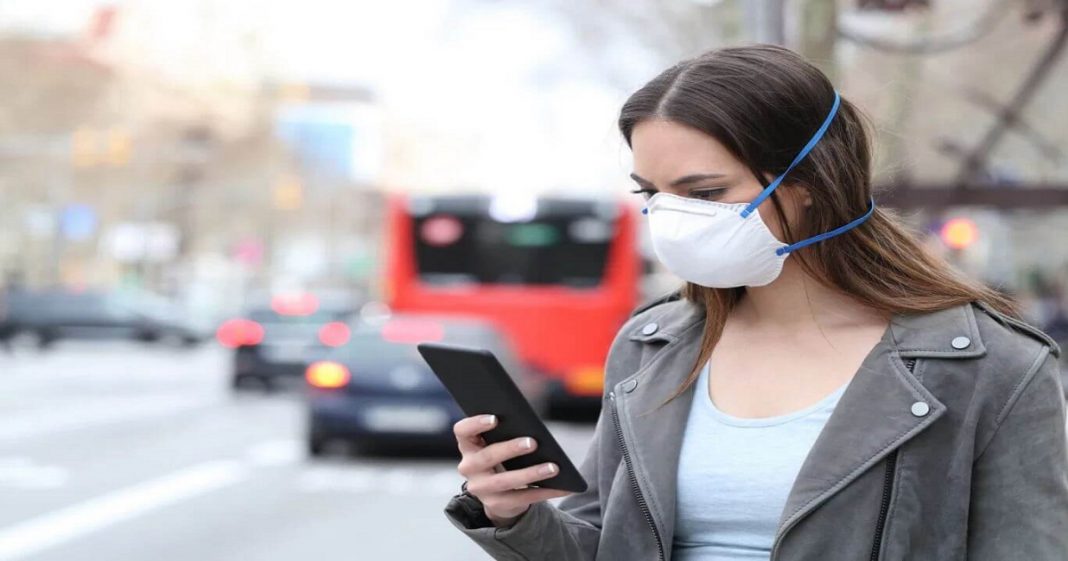The trial of an app, which will track individuals’ recent contacts after being tested positive with coronavirus, will start in the UK on Tuesday.
The healthcare and council workers in the Isle of Wight will start testing the app introduced by the British government on Tuesday, and the rest of the population on the island will be able to download it later this week.
The contact-tracing app will be available across the whole country in a few weeks if the trial is successful, Health Secretary Matt Hancock said in a daily news briefing on Monday.
NHS App Trial Starts As No 10 Plans Next Phase. Smartphone contact-tracing to begin this week in Isle Of Wight. Suggested work day mooted when commuters return to offices – https://t.co/costrGrefP 👍 @joncstone#frontpagestoday #UK #TheIndependent #digital #buyapaper 🗞 pic.twitter.com/iYC4Ah8ZlS
— 𝙵𝚛𝚘𝚗𝚝 𝙿𝚊𝚐𝚎𝚜 𝚃𝚘𝚍𝚊𝚢 📰 (@ukpapers) May 4, 2020
He urged all people in the Isle of Wight – an island off the coast of southern England – to download the new app.
“By downloading the app, you are protecting your own health, you are protecting the health of your loved ones and the health of your community,” Hancock said.
The contact-tracing app: How it works?
Contact tracing is a method used to slow down the spread of infectious outbreaks. It is commonly used in sexual health clinics when infected patients are told to contact anyone with whom they have been intimate.
In the coronavirus pandemic, it means tracking down anyone sufferers have been in prolonged contact with, to potentially ask them to self-isolate.
Read more: Tracking the spread of coronavirus: Apple & Google explain new technology
This is often done through phone calls to the friends and family of coronavirus sufferers, complemented by an automated location-tracking mobile app.
Unlike tracing in sexual health clinics, it can be difficult to know who you’ve come into close enough contact with to spread coronavirus. And scientists don’t entirely agree what “close contact” is.
Australia's COVIDSafe contact tracing story is full of holes and we should worry: The government's coronavirus strategy bets heavily on an unproven COVID-19 tracing app, but the lack of a working back end and ham-fisted messaging risks the loss of the… https://t.co/pvo1lPcG5R
— Peng Li – Tech Guy (@HangWalp) May 4, 2020
The World Health Organization recommends staying one metre apart, while the UK government recommends two. Its scientific advisers say two seconds spent one metre apart is as dangerous as spending one minute two metres apart.
Only distance will be captured by the app, so it will miss many of these key risk factors, like length of time spent in proximity with some and in what setting (inside or outside, well-ventilated or not).
Read more: Examining ‘Coronavirus contact tracking App’: How can it help & is it effective?
These will have to be picked up in discussions with the “army” of contact tracers.
Contact tracing is already being used extensively by various countries, including Hong Kong, Singapore and Germany.
What will contact tracing look like in the UK?
The 18,000-strong team will feature about 3,000 civil servants and health workers, and 15,000 call handlers.
This telephone system will be used in tandem with a tracing app, available to download on smartphones.
Using Bluetooth, the free app tracks when its users come into contact with each other, automating the tracing process. If a user develops coronavirus symptoms, it is up to them to let the app inform the NHS.
Their disclosure may trigger an anonymous alert to users with whom they recently had significant contact, again potentially asking those people to go into quarantine or be tested.
https://twitter.com/aral/status/1257555649162022913
For those without smartphones, an alternative could be a Bluetooth-enabled wristband, like those being used in other countries to detect lockdown breaches.
Announcing details of the Isle of Wight trial, Health Secretary Matt Hancock said the programme will allow the government to take a “more targeted” approach to the lockdown while containing the virus.
The app will take “full consideration” of privacy concerns, Mr Hancock said
“Where the Isle of Wight goes, Britain follows.”
Read more: Apple & Google decide to fight COVID-19 with smartphone technology
“Part of a new test, track and trace program, the app will work together with enhanced contact tracing services and swab testing for those with potential COVID-19 symptoms to help minimise the spread of COVID-19,” a government statement said.
The app will “detect any other app users that the person has been in significant contact with over the past few days, including unknown contacts such as someone they may have sat next to on public transport,” when someone reports symptoms through it.
It will “anonymously alert these contacts and provide advice,” it added.
Why was the Isle of Wight chosen for the trial?
Mr Hancock says the elderly population on the island – and projected lower number of smartphone users – was a factor in choosing it.
He says this means the trial will therefore address “as many of the challenges” as possible in rolling the app out nationwide.
John Newton, the UK government’s testing co-ordinator, says that relatively restricted travel to the island makes it an “ideal place” to study the spread of a virus.
Read more: Scientists begin genetic search to trace evolution of COVID-19
Following Italy, the UK has the second highest number of deaths due to the coronavirus pandemic in Europe with almost 29,000 victims.
There are currently more than 190,000 people who have tested positive across the country and around 4,000 people test positive on daily basis.
Anadolu with additional input from GVS News Desk.














